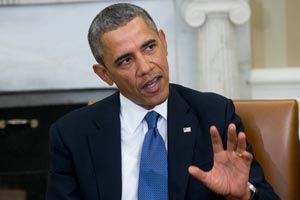President Obama Vetoes Keystone Pipeline Bill

President Barack Obama issued the third veto of his presidency Feb. 24 to reject legislation that would allow the Keystone XL pipeline to be built, escalating a battle over the project between the White House and Republicans in Congress.
Notice of the long-expected veto was released without fanfare via a message to the Senate just hours after the bill formally arrived at the White House. The Senate has agreed to hold a vote on overriding the veto no later than March 3.
“Through this bill, the United States Congress attempts to circumvent longstanding and proven processes for determining whether or not building and operating a cross-border pipeline serves the national interest,” the veto message said.
White House press secretary Josh Earnest said Obama’s rejection was strictly about the legislation and not the project. It’s “certainly possible” that Obama would eventually approve the pipeline once a State Department review is completed, he said, without giving a timetable.
“The president will keep an open mind,” Earnest said, repeating past administration language.
In passing the legislation, the Republican-controlled House and Senate both fell short of the two-thirds majority needed to override a presidential veto. That will leave Republican leaders searching for more votes if they want to keep the measure alive, which they vowed to do.
House Speaker John Boehner called Obama’s veto “a national embarrassment.”
Obama is “too invested in left-fringe politics to do what presidents are called on to do, and that’s put the national interest first,” the Ohio Republican said in a statement. “We are not going to give up in our efforts to get this pipeline built.”
Canada’s minister of natural resources, Greg Rickford, said the debate over the pipeline is between the president and the American people, who he said support the project.
“It is not a question of if this project will be approved; it is a matter of when,” he said in a statement.
Obama’s decision was never in doubt. He’s repeatedly said a State Department review of the TransCanada Corp. project — which would carry crude oil produced in Alberta, Canada, south through the U.S. — should proceed before a decision is made on whether to allow construction of the $8 billion pipeline.
The State Department has given no firm timeline for its review of the pipeline, which was first proposed six years ago. Earnest said Feb. 24 he had no update on the process.
“I would anticipate that once the review has been completed, there would not be a significant delay in announcing the results of that review” making a final decision, he said.
The project has pitted Republicans and some labor groups, who argue construction and operation of the pipeline would bring thousands of jobs, against environmental advocates who warn that leaks would spoil land along its route and exploiting the crude from tar sands will contribute to climate change.
Consulting firm IHS Inc. said in a study released Feb. 23 that most of the oil transported by the Keystone pipeline would be consumed in the U.S. and that the project would have a “negligible” impact on greenhouse gas emissions because use of North American oil would replace imported crude.
Obama, who’s made fighting climate change a main focus of his last two years in office, has stayed away from giving a final opinion on the project’s merits while saying he’d oppose if it would significantly increase carbon dioxide emissions.
Landowners in Nebraska, which the pipeline would traverse, are also fighting it in state court. TransCanada earlier this month agreed to delay acquiring land in the state while it deals with claims by landowners that the law that lets the company appropriate their property is invalid.
Falling oil prices and an improving U.S. job market have conspired conspire to weaken practical or political payoffs for Keystone advocates.
After using his veto pen only twice during his first term, the lowest of any president since James Garfield, who served only 200 days before he was assassinated, the Republican takeover of the Senate prompted Obama since the start of the year to threaten vetoes of 12 other pieces of legislation.

